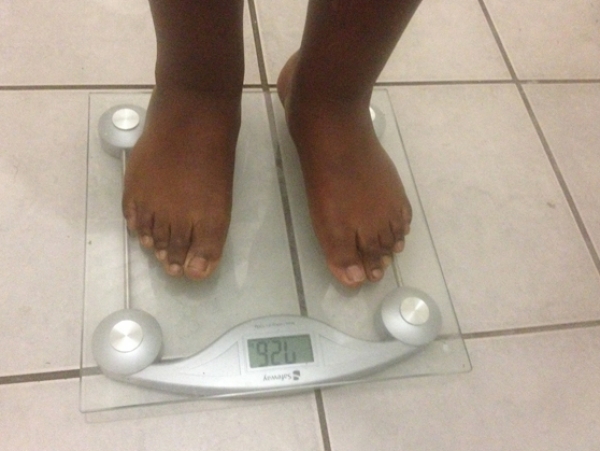Struggling with childhood obesity

Sindi (not her real name) is a 13-year-old girl who lives in the informal settlement of Masiphumelele near Fish Hoek in Cape Town. She meets the definition of being obese.
“At school they call me names and I just choose to ignore them. I laugh them off even though they hurt me.”
She continues, “There is nothing I can do about it. I am fat and people are always going to be rude to me.”
Child therapist, Gill Liprini, says children who are overweight often have a low self-image.
“Not only do they get teased, but they also suffer the humiliation of not being able to do sport because of their weight. They feel ashamed of their bodies. They feel embarrassed when they have to change for a sporting event. They either become withdrawn so as not to be noticed, or bully, become angry and aggressive, as they are often bigger than others,” she says.
A fact sheet by Healthychildren.org in 2013 confirms that many obese children suffer from low self-esteem and are victims of bullying, as is the case with Sindi.
Likho Xhanti from Philippi told GroundUp that she doesn’t even take part in sport anymore because she is unable to be active for a long period of time.
“I dont see the use of playing netball because I can’t play the whole game. I get tired within 15 minutes and I always have to think about what people might be saying behind my back,” she says.
The prevalence of obesity amongst black South African children is high.
Moreover, at least one study has found that, amongst city-dwellers, living in an informal settlement means you are at more likely to be overweight or obese.
Association for Dietetics South Africa (ADSA) spokesperson Pontsho Malibe says the South African Health and Nutrition Examination Survey( page 211) found that nearly 13.5% of children aged six to 14 in urban informal settlements in cities are overweight or obese. This compares to less than 10% in formal urban areas.
When people do not have a lot of money they tend to spend it mainly on foods like pap, and not on a variety of foods including fruit, vegetables and meat.
Another study by the Medical Research Council showed 29% of adult men and 56% of women were classified as overweight or obese.
The Global Burden of Disease Analyses published in 2002 by the International Obesity Task Force ranked South Africa as the third most obese country in Africa for children between the ages of five to 14, with Ethiopia and Zimbabwe on top.
The United Nations Children’s Fund (UNICEF) found that the prevalence of obesity among children aged two to five in Morocco, Swaziland, Botswana and Nigeria was 11% which was half of South Africa’s prevalence of 22.7% for the same age group.
“Regional and international comparisons show that SA pre-school aged children have a major problem of being overweight or obese,” says Malibe.
Obesity is defined as having a body mass index (BMI) above 30 (click here to calculate your BMI). It is caused, says Malibe, “by an imbalance in what a person eats and how active he or she is. When the body obtains more energy than it uses over a long period of time, then the excess energy will be stored as body fat.”
Easy access to unhealthy fast food, eating large portions, lack of safe facilities for doing physical activity and sedentary lifestyles, like watching television and video games for long hours, all contribute to obesity says Malibe.
“Child obesity is huge problem. It’s an uncontrollable cycle with obese adults usually producing obese children who later in life became obese adults themselves. Then the cycle continues,” says Ntungwa.
Nceba Jonas, physical education instructor at Ukhanyo Primary School in Masiphumelele, says many parents don’t see obesity as a problem.
“I don’t know how many times I have talked to them about a healthy diet but all I hear is how expensive it is to buy those foods,” says Jonas.
A fact sheet by the reputable United States Centers for Disease Control and Prevention says obese children have a higher risk of heart disease, diabetes and several other diseases in adulthood.
In Masiphumele several organisations including Hope2Africa are working at encouraging children to play more sport. Volunteer Vuyo Bhushula says, “During school holidays and weekends, we play basketball, soccer and volleyball and children enjoy it.”
Support independent journalism
Donate using Payfast

Don't miss out on the latest news
We respect your privacy, and promise we won't spam you.
Next: The battle for Rolihlahla Park
Previous: The battle for Rolihlahla Park

This article is licensed under a Creative Commons Attribution-NoDerivatives 4.0 International License.
